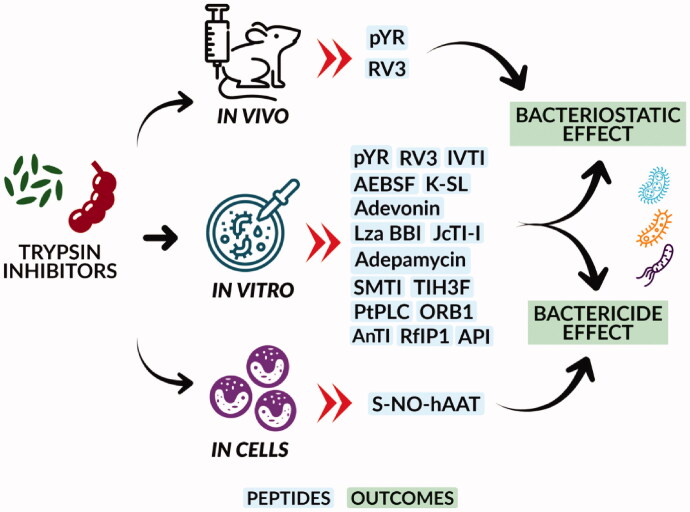Figure 2.
Antibacterial effects of trypsin inhibitors. Trypsin inhibitors can act by generating a bactericidal effect, causing the death of bacteria or a bacteriostatic effect, where bacterial growth is suppressed (keeping them in the stationary growth phase). pYR: peptide synthesised from anuran skin secretions; RV3: peptide synthesised from sunflower trypsin inhibitor; IVTI: Inga Vera seed trypsin inhibitor; AEBSF: 4-(2-aminoethyl) benzenesulfonyl serine protease inhibitor; K-SL: inhibitor synthesised from frog skin secretion; Adevonin: synthetic inhibitor produced from Adenanthera pavonin trypsin inhibitor; LzaBBI: synthetic inhibitor produced from the inhibitor of L. auriculata seeds; JcTI-I: inhibitor produced from Jatropha curcas seed; Adepamycin: synthetic inhibitor produced from Adenanthera pavonin trypsin inhibitor; SMTI: trypsin inhibitor isolated from Streptomyces misionensis; TIH3F: peptide synthesised from the junction of cathelicidin with a trypsin inhibitory loop; PtPLC: inhibitor synthesised from the arthropod serine protease inhibitor, Portunus trituberculatus; ORB1: trypsin inhibitor produced from amphibian skin; AnTI: Acacia nilotic L trypsin inhibitor; RfIP1: Rhamnus frangula trypsin inhibitor; API: trypsin inhibitor from Albizia amara seeds; S-NO-hAAT: inhibitor synthesised from human α1-antitrypsin

